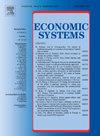Effects of trilemma policies patterns on monetary policy credibility
IF 3.3
2区 经济学
Q1 ECONOMICS
引用次数: 0
Abstract
The open economy trilemma refers to the impossibility of a country fully and simultaneously achieving three political objectives: monetary policy independence, exchange rate stability and financial openness. However, corner configurations related to the three policies of the trilemma are increasingly rare. In fact, countries tend to choose a policy combination composed of partial financial integration, managed exchange rate flexibility and partial monetary independence. Given the possibility of intermediate choices, there exists an index able to measure the relative divergence (or convergence) regarding the policy choices of the trilemma. The index identifies whether countries are adopting similar (or divergent) policy mixes in relation to the trilemma policy options. However, the consequences of adopting a more (or less) convergent policy arrangement on monetary policy credibility are unknown. Hence, this study investigates the effects of trilemma policies convergence patterns on monetary policy credibility. The idea is to verify whether a more convergent arrangement of policies related to the trilemma in open economies helps build monetary policy credibility. Our database is formed by 94 (developed and developing) countries with different characteristics. Thus, we run estimates based on a family of Tobit models for different sub-samples of countries, and also considering different periods – before and after the Global Financial Crisis. The study brings important practical implications. In general, the findings show that a convergent strategy increases credibility. The estimates corroborate the idea that countries adopting divergent policies from the global standard tend to be more exposed to economic instability and, as a result, have difficulties in anchoring inflation expectations.
三难困境政策模式对货币政策可信度的影响
开放经济三难困境是指一个国家不可能同时全面实现货币政策独立、汇率稳定和金融开放三个政治目标。然而,与三难困境的三个政策相关的拐角配置越来越少。事实上,各国倾向于选择由部分金融一体化、有管理的汇率灵活性和部分货币独立性组成的政策组合。鉴于中间选择的可能性,存在一个能够衡量三难困境中政策选择的相对分歧(或收敛)的指数。该指数确定了各国在三难选择的政策选择方面是否采取了相似(或不同)的政策组合。然而,采取更多(或更少)趋同的政策安排对货币政策可信度的影响尚不清楚。因此,本研究探讨三难困境政策趋同模式对货币政策可信度的影响。这个想法是为了验证开放经济体中与三难困境相关的更趋同的政策安排是否有助于建立货币政策的可信度。我们的数据库由94个(发达国家和发展中国家)组成,具有不同的特点。因此,我们基于一系列Tobit模型对不同国家的子样本进行了估计,并考虑了全球金融危机前后的不同时期。该研究具有重要的现实意义。总的来说,研究结果表明,趋同策略增加了可信度。这些估计证实了这样一种观点,即采取与全球标准不同政策的国家往往更容易受到经济不稳定的影响,因此难以稳定通胀预期。
本文章由计算机程序翻译,如有差异,请以英文原文为准。
求助全文
约1分钟内获得全文
求助全文
来源期刊

Economic Systems
ECONOMICS-
CiteScore
4.90
自引率
0.00%
发文量
83
审稿时长
48 days
期刊介绍:
Economic Systems is a refereed journal for the analysis of causes and consequences of the significant institutional variety prevailing among developed, developing, and emerging economies, as well as attempts at and proposals for their reform. The journal is open to micro and macro contributions, theoretical as well as empirical, the latter to analyze related topics against the background of country or region-specific experiences. In this respect, Economic Systems retains its long standing interest in the emerging economies of Central and Eastern Europe and other former transition economies, but also encourages contributions that cover any part of the world, including Asia, Latin America, the Middle East, or Africa.
 求助内容:
求助内容: 应助结果提醒方式:
应助结果提醒方式:


